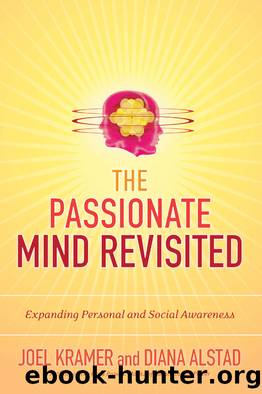The Passionate Mind Revisited by Joel Kramer

Author:Joel Kramer [Kramer, Joel]
Language: eng
Format: epub
ISBN: 978-1-58394-814-9
Publisher: North Atlantic Books
Published: 2013-07-30T00:00:00+00:00
COMMENTARY: Love and Care
Unlike earlier chapters with a more inward focus, this discussion about love moves into the social arena, where relationships play out the drama of what it is to be a human social animal. Humans share with other social mammals an ancient and sophisticated limbic brain with extraordinary capacities for emotional sensitivity and attunementâmany yet undeveloped and unrecognized. Our exceptionality lies in being a thinking mammal whose sociability is greatly influenced by ideas and values. This chapter on love and intimacy contains revealing examples of how beliefs and values on core issues within different worldviews have implications and consequences that partly determine personal and social relations.
Traditional spiritual worldviews, both monotheistic and Eastern ones, create a destructive polarity between the spiritual and the mundaneâwhich is tellingly often called the âprofaneââand then trivialize any concern that they define as ânon-spiritual.â Unity worldviews, though professing to be non-dual, have a hidden duality between the spiritual and mundane, in which the âspiritualâ is considered âmore realâ and of course superior, with no acknowledged interface between the two supposedly separate spheres.
In contrast, in The Passionate Mind Revisited the One and the Many, merging and individuation, unity and multiplicity (separation), are viewed as dialectically embedded in each other, with neither being more ârealâ nor valuable than the other, as they are not totally separate at all. Neither side of the apparent duality has ontological priority. (Ontology is the study of âbeing,â or more simply âWhat, if anything, is really real?â) From these disparities in worldviews, many differences flowâincluding the nature of love and loving, and what distinguishes loving from caring. As this chapter makes clear, our perspective acknowledges the reality and value of self, ego, time, expectations, attachment, desire, fear, demands, control, boundaries, measuring, self-protection, and other issues that come up between two or more selves living and loving together through time.
To say that unity worldviews do not effectively address the plurality of diverse, individuated selves or relationships between and among themâgiven that many consider the self and ego illusoryâis an understatement. Because love is relational, involving more than one person, even though unity worldviews champion ideals of unity and love that sound good, in actuality they do not encompass the reality of the self or selves, nor the complex issues involved in separate selves connecting. Instead the unrealistic, dysfunctional guidelines put forth by a unity worldview mislead people, causing unnecessary havoc in an arena that in the modern world has become complex and potentially problematic in and of itself.
Worldviews are the source of values. Worldviews that negate the reality of the self, boundaries, separation, individuation, the importance of time, and thus change and evolution, cannot construct viable ideals or guidelines for relationships between two or more people, let alone for evolving, passionate ones. Unity worldviews that negate the value of attachment and desire claim to offer better values and a loftier concept of loveâand therein lies the problem. They are too âlofty,â supposedly on a higher, spiritual plane, above the crass, ego-involved, self-centered dramas that occupy so much of this imperfect world.
Download
This site does not store any files on its server. We only index and link to content provided by other sites. Please contact the content providers to delete copyright contents if any and email us, we'll remove relevant links or contents immediately.
Inner Engineering: A Yogi's Guide to Joy by Sadhguru(6780)
The Power of Now: A Guide to Spiritual Enlightenment by Eckhart Tolle(5738)
Fear by Osho(4724)
Ikigai by Héctor García & Francesc Miralles(4228)
The Art of Happiness by The Dalai Lama(4118)
The Ultimate Bodybuilding Cookbook by Kendall Lou Schmidt(3925)
Yoga Therapy by Mark Stephens(3739)
The Little Book of Hygge by Meik Wiking(3675)
The Healing Self by Deepak Chopra(3564)
Why Buddhism is True by Robert Wright(3439)
The Hatha Yoga Pradipika (Translated) by Svatmarama(3311)
Being Aware of Being Aware by Rupert Spira(3264)
Shift into Freedom by Loch Kelly(3190)
Wild Words from Wild Women by Stephens Autumn(3132)
Work Clean by Dan Charnas(3108)
Happiness by Matthieu Ricard(3037)
More Language of Letting Go: 366 New Daily Meditations by Melody Beattie(3017)
Yoga Body & Mind Handbook by Jasmine Tarkeshi(2861)
Why I Am Not a Feminist by Jessa Crispin(2737)
